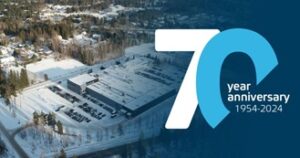
Teleste Corporation celebrates its 70th anniversary this year. On January 22, 1954, Mr. Olavi Ahonen submitted a business declaration to the magistrate’s office of Turku, Finland, outlining his intention to commence the manufacturing of radio and antenna equipment under the business name Sähköteknillinen Tehdas Teleste. The company’s registered office was established in Turku, where Teleste’s head office is still located.
According to the company, customer understanding, cooperation and high quality have been integral to Teleste’s core values since the beginning. Starting with its first own product, an antenna socket, the company has gained recognition for its unwavering Finnish engineering expertise and the ‘spirit of getting things done’, effectively addressing customers’ challenges. In this anniversary year, the objective is to showcase these longstanding traditions, along with the company’s current and future role as a builder of smart, safe, and smooth everyday life.
Teleste CEO Esa Harju says that over the course of 70 years, Teleste has undergone various transformations and adaptations. This evolution has been propelled by technological breakthroughs and the newfound opportunities they bring.
” As a company, we have taken numerous significant developmental strides throughout the decades, witnessing the transformation of the technologies and solutions we represent into forms that would have been unimaginable at the time of our founding year. Presently, we extend our services to customers across multiple continents and industries, yet our operations remain anchored in the same fundamental principles: high-level engineering expertise and a profound understanding of customer needs. Our aspiration is to continue being our customers’ most reliable partner, both now and in the future.”
Teleste’s current industries are integral to the fabric of people’s lives and society’s infrastructures, both globally and locally. Digital technologies and ultra-fast broadband networks constitute the backbone of a networked society, delivering services to consumers and aligning seamlessly with sustainable development goals. The digitisation of information and new, smart innovations simplify and enhance public transport, fostering environmentally friendly mobility. Smart and integrated technologies play a crucial role in enhancing people’s safety in public spaces and safeguarding critical infrastructure.











